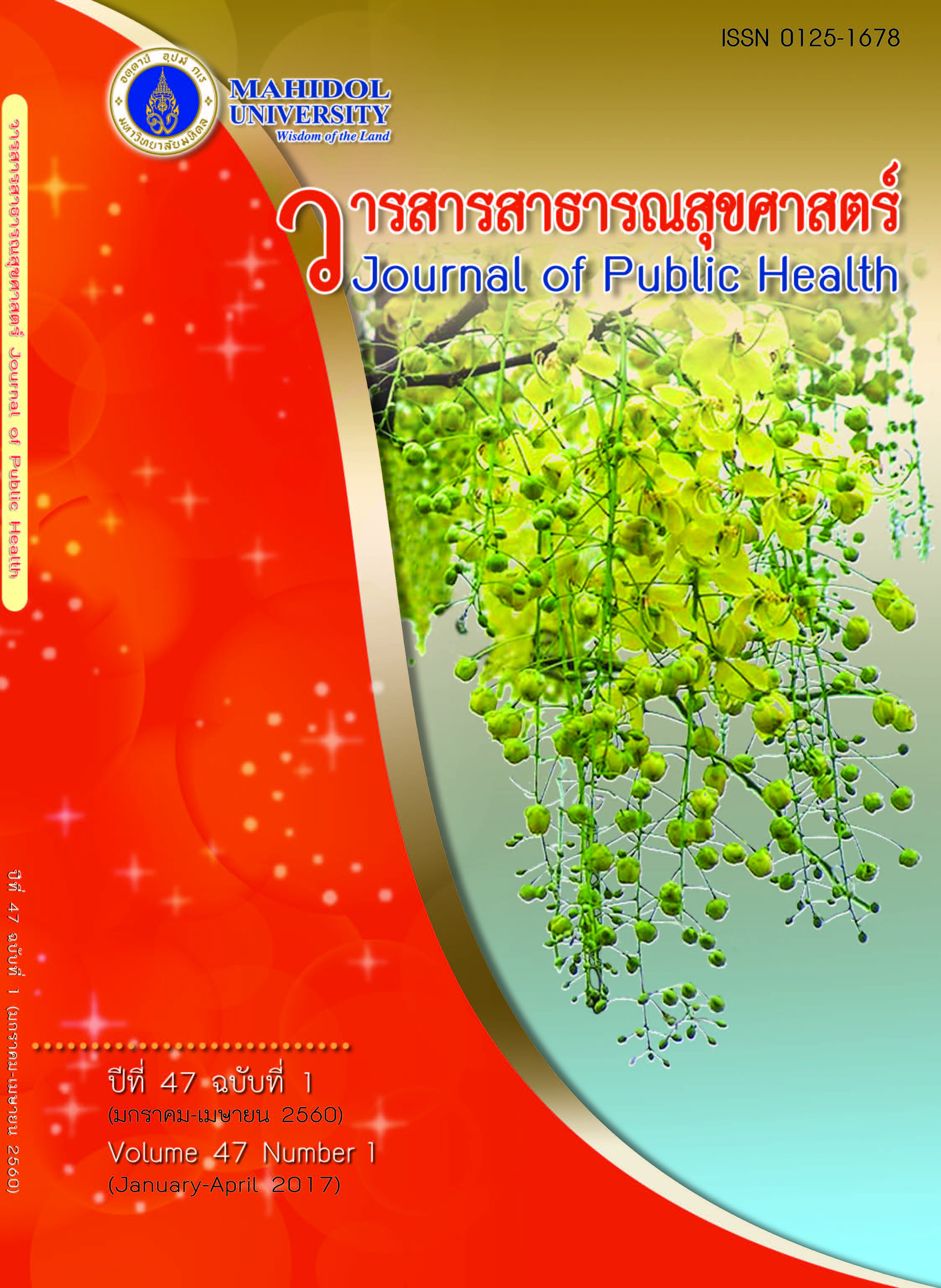ผลของโปรแกรมส่งเสริมการรับรู้สมรรถนะแห่งตนต่อพฤติกรรมการเลี้ยงลูกด้วยนมแม่ของมารดาวัยรุ่นในชุมชน
Keywords:
การรับรู้สมรรถนะแห่งตน, พฤติกรรมการเลี้ยงลูกด้วยนมแม่, มารดาวัยรุ่นในชุมชน, promoting self-efficacy, breastfeeding behavior, adolescent mothers in communityAbstract
มารดาวัยรุ่นเป็นกลุ่มที่มีอัตราการเลี้ยงลูกค่อนข้างต่ำ และเสี่ยงต่อการเกิดปัญหาในการเลี้ยงลูกด้วยนมแม่ การวิจัยแบบกึ่งทดลองนี้มีวัตถุประสงค์เพื่อศึกษาผลของโปรแกรมส่งเสริมการรับรู้สมรรถนะแห่งตนต่อพฤติกรรมการเลี้ยงลูกด้วยนมแม่ของมารดาวัยรุ่นในชุมชน กลุ่มตัวอย่างเป็นมารดาวัยรุ่นครรภ์แรกหลังคลอด 1 สัปดาห์ ในพื้นที่ตำบลคลองหนึ่งถึงคลองเจ็ด อำเภอคลองหลวง จังหวัดปทุมธานี คัดเลือกกลุ่มตัวอย่างตามเกณฑ์ที่กำหนดจำนวน 60 ราย แบ่งเป็นกลุ่มควบคุม 30 ราย กลุ่มทดลอง 30 ราย โดยกลุ่มควบคุมได้รับการดูแลตามปกติ กลุ่มทดลองได้รับโปรแกรมส่งเสริมการรับรู้สมรรถนะแห่งตนในการเลี้ยงลูกด้วยนมแม่ร่วมกับการดูแลตามปกติ เก็บรวบรวมข้อมูลโดยใช้แบบบันทึกข้อมูลส่วนบุคคล และแบบสังเกตพฤติกรรมการเลี้ยงลูกด้วยนมแม่ วิเคราะห์ข้อมูลโดยการแจกแจงความถี่ ร้อยละ ค่าเฉลี่ย ส่วนเบี่ยงเบนมาตรฐาน การทดสอบค่าที และการใช้สถิติสัมประสิทธิ์สหสัมพันธ์เพียร์สัน (Pearson’s Product-moment Correlation Coefficient) ผลการศึกษาพบว่า กลุ่มทดลองมีคะแนนเฉลี่ยพฤติกรรมการเลี้ยงลูกด้วยนมแม่ (X = 51.80,SD = 5.37) สูงกว่า กลุ่มควบคุม (X = 33.60, SD = 6.53) อย่างมีนัยสำคัญทางสถิติ (P < .001) ผลการวิจัยนี้สามารถนำมาใช้เป็นแนวทางในการเสริมสร้างสมรรถนะให้มารดาวัยรุ่นในชุมชนมีความมั่นใจในการให้นมแม่และประสบความสำเร็จในการเลี้ยงลูกด้วยนมแม่
The Effects of Promoting Self-Efficacy Program on Breast Feeding Behavior among Adolescent Mothers in Community
Adolescent mothers constitute a group that practices breastfeeding at a rather low level and these mothers are in s high-risk group. The purpose of this quasi-experimental research was to study the effects of promoting a self-efficacy program on breastfeeding behavior among adolescent mothers in community. The sample group of adolescent mothers, in the one week postpartum period, and living in Khlong Nueng, Khlong Luang, Pathum Thani. The 60 adolescent mothers were selected through inclusion criteria and were divided equally in two groups: control and experimental. The samples in the control group received only routine care, whereas those in the experimental group participated in the perceived self-efficacy promoting program together with routine care. Data collection was carried out through a personal data questionnaire and a breast feeding behavior observation form. The research employed descriptive statistics, independent t-test and Pearson’s product-moment correlation coefficient to analyze data. The study revealed that the adolescent mothers in the experimental group had significantly higher mean scores of breastfeeding behavior (X = 51.80, SD = 5.37) compared with the mean scores of adolescent mothers in the control group (X = 33.60, SD = 6.53) at a level of p<.001. These results can be used as basic information to promote self-efficacy and breastfeeding ability on the part of adolescent mothers in community, resulting in successful breastfeeding.
Downloads
Published
Issue
Section
License
Creative Commons License CC-BY-ND


